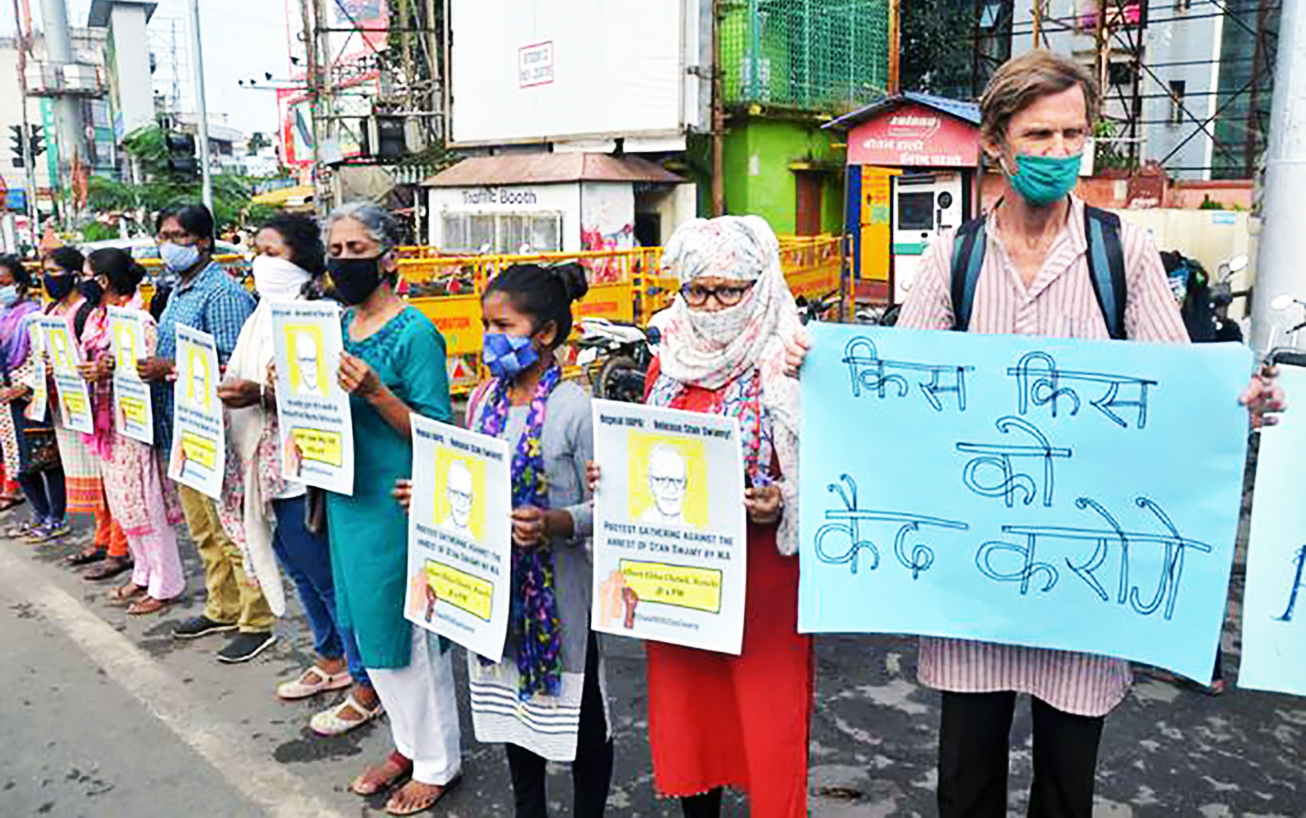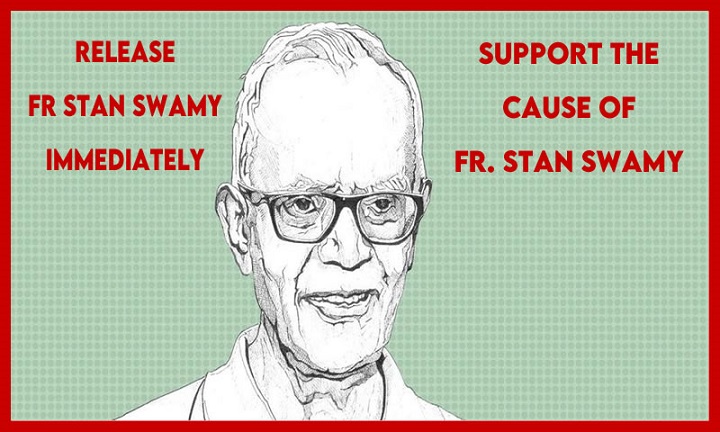Women against Sexual Violence and State Repression (WSS) is appalled at the arrest of Father Stan Swamy, an elderly Jesuit priest, by the NIA in the infamous Bhima Koregaon – Elgar Parishad conspiracy case on the night of 8 October, 2020. Fr. Stan Swamy was working on adivasi issues for the past 5 decades. He advocated for laws grounded in the Fifth Schedule of the Indian Constitution, he decried the lack of rules for PESA in Jharkhand, making the implementation of the act impossible. He deprecated the lack of seriousness in successive governments, as they ignored the fundamental issues of the Forest Rights Act. Fr. Swamy was a vociferous supporter of the Pathalgadi movement in Jharkand – a movement of self-assertion by the Adivasi community, which sought to exert Adivasi control over their villages. However, this movement was declared unlawful by the state government and Fr. Stan and other leaders were charged with sedition.
Women against Sexual Violence and State Repression (WSS) is appalled at the arrest of Father Stan Swamy, an elderly Jesuit priest working on adivasi issues for the past 5 decades in the infamous Bhima Koregaon – Elgar Parishad conspiracy case on the night of 8 October, 2020. WSS condemns this most recent arrest of a sterling activist and a reputed authority, and calls out the sheer absurdity of charges against this kindly and gentle soul. We note that the investigation into Bhima-Koregaon violence on 1st Jan 2018 has turned into a farcical witch-hunt against the leading human rights activists in the country, in which 15 other lawyers, activists, writers, poets, intellectuals and activists of renown have already been imprisoned under similarly ludicrous charges, some for over two years.
Fr. Stan Swamy, originally from Trichy in Tamil Nadu, came to Jharkhand as a young priest, in order to understand the problems facing the Adivasi people. He lived in an Adivasi village in the East Singhbhum district of Jharkhand for two years, researching their socio-economic conditions, their communities and values, and the systems of exploitation that encircled them. He returned to Jharkhand again, after 15 years of service at the Indian Social Institute of Bangalore, including 10 years as its director. In Jharkhand, he worked to revive JOHAR- the Jharkhandi Organization for Human Rights, and also worked with JOAR- the Jharkhandi Organization Against Uranium Radiation – which protested the environment destruction and community impoverishment due to the Uranium Corporation of India (Ltd). He was instrumental in setting up the Bagaicha center in Ranchi, a training centre for Adivasi youth, which was also a space to research and collaborate on action plans regarding marginalized populations.
Fr. Stan’s work in Jharkhand has had two major thrusts, both of which put him at loggerheads with the powerful interests shielded by the Central government. One important part of his work has been to challenge the corporate-state nexus exploiting traditional Adivasi resources. Jharkhand is a mineral-rich state, accounting for approximately 40% of India’s mineral resources. Yet, over 39% of its population, heavily tribal, is below the poverty level. The race to exploit its abundant natural resources has often pitted the state’s machinery against the tribal populations, who fear facing displacement and further impoverishment.
It is in this context that Fr. Stan Swamy advocated for laws grounded in the Fifth Schedule of the Indian Constitution, assuring a modicum of autonomy and self-governance to tribal areas. He decried the lack of rules for PESA (Provisions of the Panchayat Raj – Extension to Scheduled Areas- Act, 1996) in Jharkhand, making the implementation of the act impossible. He deprecated the lack of seriousness in successive governments, as they ignored the fundamental issues of the Forest Rights Act that had the potential the grant security of tenure to thousands of Adivasi and other forest-dwelling families. Fr. Swamy lent his full hearted support to many struggles, small and big, of Adivasi communities trying to protect their land, water and forest resources. He was a vociferous supporter of the Pathalgadi movement in Jharkand – a movement of self-assertion by the Adivasi community, which sought to exert Adivasi control over their villages, taking inspiration from the Indian Constitution and some Supreme Court judgments. However, this movement was declared unlawful by the state government and Fr. Stan and other leaders were charged with sedition. It is only after fresh elections threw up a new government that these charges were withdrawn, illustrating the political nature of these charges.
Fr. Stan’s other serious engagement in the recent years has been with the Adivasi youth languishing in Jharkhand jails on trumped up charges of involvement in Naxal activities. Research conducted by him for his book, “Jail Mein Band Qaidiyon ka Sach” showed that of the 3000 such prisoners who were interviewed either directly or via their families, 98% had no involvement with Naxal activities, but ended up spending years awaiting trial before being finally acquitted. On the basis of this research, he was able to move the Jharkhand High Court in a Public Interest Litigation, seeking interim bail for such youth, early disposal of these cases, and the constitution of a Commission of Inquiry that would conduct a comprehensive fact-finding in all 24 districts of Jharkhand on this issue. Fr. Stan Swamy also filed complaints with the National Human Rights Commission against instances of extra-judicial killings and the false surrender of ordinary villagers as “Naxalites” under duress and coercion.
His interest and focus on Adivasi youth in prisons led him to convene a well-publicized meeting of all lawyers and activists working with tribal prisoners in different states in Central India and facing similar problems of false arrests, in 2015. This meeting, co-convened with Advocate Sudha Bharadwaj – was the genesis of the Persecuted Prisoners Solidarity Committee (PPSC) – a group that is addressing issues of adivasis and dalits languishing in the prisons of West Bengal, Chhattisgarh, Jharkhand and Odisha.
Clearly, the manner in which Fr. Stan Swamy was arrested a night earlier and made to reach Mumbai just before the final charge sheets were to be filed by the NIA in the Bhima Koregaon case on October 9 shows they were in desperate hurry to frame all whom they could on this single Bhima Koregaon FIR. Else, he could have been detained when his premises were searched in 2018 and 2019 or more recently during the 15 hours’ interrogation two months back. His arrest on fictitious charges of Maoist involvement, is steeped in irony given his endeavours to seek justice for others similarly incarcerated. WSS believes that the real reasons for his arrest have more to do with his steadfast and principled opposition to the pro-corporate and anti-people politics espoused by the BJP-led government in power. We denounce this arrest, as also all the previous arrests in this case, and also voice our strong criticism of the way investigation agencies such as the NIA are being unabashedly used by the Central Executive to carry out their political agenda. We give our unyielding support to the prisoners in this case, and wish them strength and fortitude to tide over this period, even as we redouble our efforts to secure their liberty.
If instead of being hanged by the neck
you’re thrown inside
for not giving up hope
in the world, your country, your people,
if you do ten or fifteen years
apart from the time you have left,
you won’t say,
“Better I had swung from the end of a rope
like a flag” —
You’ll put your foot down and live.
It may not be a pleasure exactly,
but it’s your solemn duty
to live one more day
to spite the enemy.
(From “Some Advice To Those Who Will Serve Time In Prison” by Nazim Hikmet)
Women against Sexual Violence and State Repression (WSS) is a non-funded grassroots effort started in November 2009, to put an end to the violence being perpetrated upon our bodies and societies. We are a nationwide network of women from diverse political and social movements from women’s organizations, mass organizations, civil liberty organizations, student and youth organizations and mass movements and also from many different walks of life. We unequivocally condemn state repression and sexual violence on women and girls by any perpetrator(s).
Email: againstsexualviolence@gmail.com


